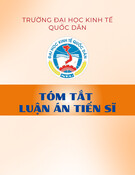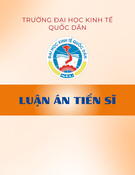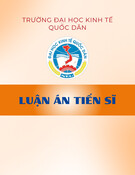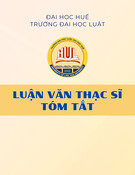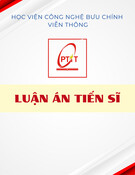MINISTRY OF EDUCATION AND TRAINING LAC HONG UNIVERSITY
VO THI TAM
THE EFFECT OF CORPORATE SUSTAINABILITY ON PERFORMANCE
OF TOURIST BUSINESSES IN VIETNAM SOUTH CENTRAL COAST
SUMMARY OF THESIS
Major: Business Administration
Code: 9340101
Dong Nai, 2021
The thesis was completed at Lac Hong University
Science Instructor: Ph.D Vo Tan Phong and Ph.D Mai Thi Anh Tuyet
Reviewer 1: .......................................................................................................................
..........................................................................................................................................
Reviewer 2: .......................................................................................................................
..........................................................................................................................................
Reviewer 3: .......................................................................................................................
..........................................................................................................................................
The thesis will be presented to the school-level thesis evaluation board at:
At ........… time ........… day …...… month ……… year ........…
The thesis can be found at the library:
- Lac Hong University
- National Library
LIST OF PUBLISHED PAPERS
International Journal
1. Tam Vo Thi (2020). The Effects of Corporate Sustainability to the Employee
Engagement: Research on Tourism Enterprises in South Central Coast Vietnam.
International Journal of Science and Research, 9(6), 1570 – 1574.
2. Tam Vo Thi & Phong Vo Tan (2020). Factors Effecting Corporate Sustainability
in SMEs: The Case of Tourist Businesses in Vietnam South Central Coast. Journal of
Economic studies, 7(506), 45 – 56.
3. Tam Vo Thi & Phong Vo Tan (2020). Relationship between Corporate
Sustainability, Employee Commitment, Local Community Participation, and
Performance of Tourist Businesses: The Case in Vietnam South Central Coast.
International Journal of Science and Research, 9(8), 966 – 972.
1
CHAPTER 1. INTRODUCTION RESEARCH THESIS
Reason to research
Consider the theoretical context
Corporate performance is a concept that has received a lot of attention in strategic
research. Along with that, the development of the concept of sustainability has led to a
change in strategic attitudes in businesses, whereby businesses need to reexamine their
business strategy model. In addition, corporate sustainability (CS) is widely used to refer
to an enterprise's approach to creating lasting value for stakeholders through the
implementation of the Business strategy focuses on economic, social and environmental
(Dyllick and Hockerts, 2002; Hahn et al, 2017; Ashrafi et al, 2019).
On the other hand, recent empirical studies have shown a positive effect of
corporate sustainability on corporate performance (Eccles et al., 2014; Tomšič et al.,
2015; Sy, 2016; El -Khalil and El-Kassar, 2018). Along with that, the stakeholder theory
shows that firms are not only accountable to its shareholders, but also consider the
interests of other stakeholders (Freeman, 2015). At the same time, activities for
corporate sustainability will promote the commitment and participation of stakeholders
to the business (Gao et al., 2016). This implies that corporate sustainability practices
influence attitudes and behaviors such as corporate commitment and participation.
A literature review shows that the majority of research on corporate sustainability
has been done in industries (Pedersen et al., 2018; Annunziata et al., 2018). At the same
time, literature review shows that tourism industry studies support that community
participation in tourism development contributes to sustainable tourism development
(Tosun and Jenkins, 1996; Tosun, 2000; Boiral et al., 2019).
In addition, although corporate social responsibility in general and corporate
sustainability in particular have been interested by researchers, especially since the
inception of the concept. Sustainable development, but so far, most researches on
corporate sustainability have been found in developed countries (Font et al, 2014;
Murray, 2017). At the same time, corporate sustainability to management as well as
practice shows a lack of knowledge of how two dimensions (conceptual and empirical)
can be integrated in corporate operations. Therefore, more in-depth analytical studies
2
related to corporate sustainability are still needed. Also, corporate sustainability research
needs more to conceptually and empirically explore (Rodrigues and Franco, 2019).
Consider the practical context
So far, the tourism industry is considered one of the largest economic sectors in the
world. According to the World Tourism Organization (UNWTO), the number of
international tourists in 2019 is estimated at nearly 1.5 billion, up 3.8% from 2018,
higher than the global economic growth (+3 %) (UNWTO, 2020). In 2019, Vietnam
welcomes over 18 million international visitors. The growth of international visitors to
Vietnam (+ 16.2%) was significantly higher than that of other countries in the region,
the total revenue from tourists reached 755 trillion VND, the direct contribution of
tourism reached 9.2 % Of GDP (Vietnam National Administration of Tourism, 2020).
Accordingly, tourism development really becomes a spearhead economic sector,
creating a driving force for the development of other industries and fields, making an
important contribution to the formation of a modern economic structure.
The Vietnam South Central Coast is endowed with abundant and diverse natural
resources. With the advantages and potentials of the Vietnam South Central Coast, it is
very convenient for tourism development. However, tourist businesses operating in the
Vietnam South Central Coast are facing many difficulties and challenges. In fact, in
Vietnam, due to not seeing the important role as well as the benefits from the
implementation of sustainable strategies, many tourist businesses have failed to fulfill
their social and environmental responsibilities. school. These damages can be mentioned
as infringing workers' legitimate rights and interests, causing environmental pollution
and not complying with environmental regulations.
Along with that, in Vietnam, researches on corporate sustainability as well as a
standard definition of corporate sustainability have not been found. Most researches in
Vietnam focus on the topic of corporate social responsibility. Therefore, research on
corporate sustainability still has research gaps that need to be explored further,
especially in the context of developing and transforming countries like Vietnam.
Therefore, research on corporate sustainability in Vietnam, in the context of the
tourism industry, is a remarkable research approach because of the environmental and
social issues associated with tourism. Research on corporate sustainability and corporate
3
performance in the current context is particularly meaningful and is an objective,
scientifically and practically urgent requirement to contribute to the common
development of Vietnam and the world.
Research gaps
Firstly, research on corporate sustainability in Vietnam is still very limited and is
a gap that needs to be studied to explore.
Second, the effect of corporate sustainability on corporate performance in the
context of developing and transforming countries like Vietnam has almost not been
studied. Therefore, it is necessary to have empirical studies to contribute to reinforcing
the theories.
Third, the effect of corporate sustainability on employee commitment and the
mediating role of employee commitment in the effect of corporate sustainability on
corporate performance is a research gap. Research needs to be done to contribute to
reinforcing stakeholder theory.
Fourth, the effect of corporate sustainability on investor commitment and the
mediating role of investor commitment in the effect of corporate sustainability on
corporate performance is a research gap. Research needs to be done to contribute to
reinforcing stakeholder theory.
Fifth, the effect of corporate sustainability on community participation and the
mediating role of community participation in the effect of corporate sustainability on
corporate performance is a research gap. Research needs to be done to contribute to
reinforcing stakeholder theory.
Finally, the practical context of the tourism industry in Vietnam is a gap that needs
to be studied.
Research objectives
Overall objectives
Identify and measure the effect of corporate sustainability on corporate
performance of tourist businesses in Vietnam South Central Coast and provide
governance implications.
4
Specific objectives
- Identify and measure the effect of corporate sustainability on corporate
performance of tourist businesses in Vietnam South Central Coast;
- Explore the mediating role of employee commitment, investor commitment and
community participation;
- Tests the difference;
- Make governance implications.
Research question
- What is the effect of corporate sustainability on the performance of tourist
businesses in the Vietnam South Central Coast?;
- Whether or not the intermediary role of employee commitment, investor
commitment and community participation in the effect of corporate sustainability on the
performance of tourist businesses in the Vietnam South Central Coast?;
- Is there a difference between groups on the effect of corporate sustainability on
the performance of tourist businesses in the Vietnam South Central Coast?;
- What governance implications should be given to support tourist businesses in
Vietnam South Central Coast increase their corporate sustainability?
Research subject and scope
Research subject
- The research object of the thesis is the effect of corporate sustainability on
corporate performance and the mediating role of employee commitment, investor
commitment and community participation;
- Respondents: Leaders of tourist businesses operating in Vietnam South Central
Coast.
Research scope
- Space scope: The thesis focuses on researching tourist businesses operating in
Vietnam South Central Coast;
- Scope of time: The topic is implemented from June 2018 to November 2020.
Research methods
Qualitative research method
Group discussion with experts is used in qualitative research.
5
Quantitative research method
Quantitative research is done through 2 steps including preliminary quantitative
research and formal quantitative research.
New points of the thesis
The research results of the thesis have shown new points compared to previous
studies, including the following contents:
Firstly, the thesis mentions the unexplored impact; specifically: the effect of corporate sustainability on the performance of tourist businesses has not been studied in
the world as well as in Vietnam.
Second, this thesis explores the mediating role of employee commitment, investor
commitment, community participation in the effect of corporate sustainability on
corporate performance that have not been researched in the world as well as in Vietnam.
Third, the thesis tests the mediating role of employees's perceptions, attitudes and
behaviors in the effect of corporate sustainability on corporate performance of tourist
businesses in Vietnam South Central Coast.
Fourth, the thesis tests the mediating role of investors's perception, attitude and
behavior in the effect of corporate sustainability on corporate performance of tourist
businesses in Vietnam South Central Coast.
Fifthly, the thesis tests the mediating role of local communities's perception, attitude
and behavior in the effect of corporate sustainability on corporate performance of tourist
businesses in Vietnam South Central Coast.
Sixthly, the mediating factors (employee commitment, investor commitment,
community participation) are analyzed in the direction of the respondents to be business
leaders. This is the difference from previous studies which were studied with the
approach of employees, local communities and investors.
Seventhly, the thesis adjusts the original scales to suit the characteristics of tourism
businesses in Vietnam South Central Coast. The thesis has added a number of new observational variables to the scale of the factors in the research model. The reliability of the new scales in the research burial shows quite high results, so subsequent studies
can be inherited.
Finally, the thesis suggests governance implications on the effect of corporate
sustainability on the performance of tourist businesses as well as the governance
implications of the mediating role of employee commitment, investor commitment,
community participation in the effect of corporate sustainability on the performance of
tourist businesses that other studies have not mentioned.
6
Contributions of thesis
Scientific contributions
Firstly, the thesis systematizes the background theories and previous studies to
research concepts in the world and in Vietnam.
Second, on the basis of the background theory and previous studies, the thesis
proposes a new research model. Research model shows corporate sustainability on
corporate performance of tourist businesses and the mediating role of employee
commitment, investor commitment, community participation and verified in Vietnam
South Central Coast.
Finally, the thesis has supplemented, adjusted and evaluated the scale of the
research concepts. These scales are completely suitable for the conditions of the South
Central Coast in Vietnam.
Practical contributions
The research results have contributed practically, specifically:
Firstly, through the survey of the actual situation, the thesis has assessed the status
of awareness as well as practice about corporate sustainable activities in tourist
businesses in the South Central Coast, Vietnam.
Second, the thesis shows the impact of corporate sustainability on the performance
of tourist businesses in Vietnam South Central Coast and the mediating role of employee
commitment, investor commitment and community participation. On that basis, the
thesis provides governance implications to support tourist businesses in the tourism
industry. These governance implications help tourist businesses increase the
understanding of corporate sustainability activities. Accordingly, tourist businesses
operate in a sustainable and thereby improve performance of the business. At the same
time, this thesis will contribute to encouraging tourist businesses to pay more attention to stakeholders in making policies and implementing business strategies.
Finally, this thesis also suggests many new research directions for researchers in
the future when research about corporate sustainability, employee commitment, investor
commitment, community participation and corporate performance in other areas.
Research structure
The research in structured into 5 chapters as follows:
Chapter 1. Introduction research thesis
Chapter 2. Theoretical foundations and research models
7
Chapter 3. Research methods
Chapter 4. Research results and discussion
Chapter 5. Conclusion and management implications
8
CHAPTER 2. THEORETICAL FOUNDATIONS AND RESEARCH MODELS
The concepts
Corporate sustainability
Concept of corporate sustainability
Corporate sustainability is a strategic model that develops its ability to create long-
term value for the business and its stakeholders. This model is intended to meet the needs
of businesses and stakeholders associated with social, economic and environmental
activities in the present and in the future.
Topics related to the concept of corporate sustainability
Wilson (2003) argues that combining corporate sustainability, corporate social
responsibility, corporate accountability and stakeholder theory we have the four pillars
of corporate sustainability. In which, corporate accountability is to report to all relevant
margins, not just the shareholders of the business.
Corporate performance
Operational efficiency is to achieve the strategic goals of the business. At the same
time, the corporate performance is assessed based on financial and non-financial
indicators.
Relationship between corporate sustainability and corporate performance
There is little empirical evidence that tests the mediating role of the mediating
variables such as employee commitment, investor commitment, community
participation in the effect of corporate sustainability on corporate performance.
Therefore, there is a need for a study to explore the mediating role in the relationship
between corporate sustainability and corporate performance.
Employee commitment
Employee commitment is a strong desire to maintain membership in the
organization and a willingness to exert considerable effort on behalf of the organization,
as well as a strong desire to maintain membership in the organization.
Investor commitment
Employee commitment is a positive feelings and a desire to be devoted to the
organization, as well as a willingness to work hard and a sense of a long-term
commitment to the organization.
9
Community participation
Community participation is the fact that local community plays an important role.
At the same time, have a voice in the local tourism development decision-making
process and be consulted and accordingly tourism policy is reviewed.
Overview of background theories
Legitimacy theory
Concept of legitimacy theory
The legitimacy theory stems from the concept of the organisation's legitimacy,
defined as a condition or state, that exists when an entity value system conforms to the
value system of the social system. large that the entity is a part of it.
Application of the theory of legitimacy of the thesis
In accordance with the legitimacy theory, businesses will engage in sustainable
development activities and report to disclose these activities. Accordingly, legitimacy
theory is a theoretical point of view widely used in research on corporate sustainability.
The legitimacy theory explains why businesses engage in activities towards the
realization of sustainable development goals.
Institutional theory
Concept of institutional
The institution is the normality of the behavior or the regulations defining the
behavior in specific situations, acceptable to the members of the social group.
Approach angle of the institutional theory of the thesis
According to institutional theory, external social, political and economic pressures
influence corporate strategies and decisions. Institutional theory is used to explain how
changes in social values and regulations influence decisions related to corporate
sustainability practices. As a result, businesses are increasingly interested in and carry
out activities towards the realization of sustainable development goals and are gaining
widespread acceptance.
Stakeholder theory
Concept of stakeholder
Stakeholders are groups and individuals that benefit or be harmed, and whose
interests are violated or respected from the actions of the business. The role of the
10
stakeholders is significant because the support from the stakeholders leads to a
successful business sustainability implementation.
Application of stakeholder theory of the thesis
According to the theory of stakeholders, businesses always try to balance the
interests of different stakeholders and manage the coherent effects in the relationships
between stakeholders and firms. Accordingly, corporate strategies for sustainable
development will positively affect the commitment and practices of stakeholders.
Resource dependence theory
Concept of resource dependence
Resource dependency theory is the study of how the external resources of an
organization influence the behavior and performance of an organization. The long-term
performance and survival of a business depends on those who provide resources outside
the business.
Application of resource dependence of the thesis
Other researchers have proposed resource dependency theory arguments to explain
why a firm can pursue stakeholder satisfaction. Resource dependency theory provides
strategists with a means of assessing potential factors that can be deployed to provide a
competitive advantage.
Review of research related
Through a review of related studies, it shows that studies on the impact of corporate
sustainability on business performance still lack empirical studies to assess the
intermediary role of stakeholders in this effect. At the same time, the thesis only finds
individual studies examining the effect of corporate sustainability on corporate
performance through the role of employee commitment (Collier and Esteban, 2007;
Choi and Yu, 2014), investor commitment (Marzouk, 2017; Crifo et al., 2019) and local
community participation (Tosun, 2006; Thammajinda, 2013; Kallio, 2018).
Studies on corporate sustainability, corporate social responsibility as well as
research on Vietnam's tourism industry in comparison to developed countries in the
world are still limited. Researches have not gone into depth research on corporate
sustainability, especially tourism businesses, and therefore there is no specific solution
to this issue.
11
Research model and research hypotheses
Basis of research model
In general, most research on corporate sustainability is found in developed
countries and focused on large industrial conglomerates. Research on the effect of
corporate sustainability on corporate performance in the context of developing and
transition countries like Vietnam is a research gaps that needs to be explored.
Through a review of previous researches, most researches on corporate
sustainability focus on large industrial groups and until recently there is a research gap
considering ownership structure, strategic direction, management characteristics and
importance in SMEs (Moneva and Hernandez, 2010; Tomšič et al., 2015). At the same
time, the author has not found any research on the effect of corporate sustainability on
corporate performance, especially tourism businesses, nor has there been any research
examining the impact of sustainability. Corporate sustainability through the mediating
role of employee commitment, investor commitment and community participation.
Therefore, the author's research will fill this research gaps.
Research hypotheses
Hypothesis H1a: Implementing the economic activities of the business has a
positively affects on corporate performance.
Hypothesis H1b: Implementing the social activities of the business has a positively
affects on corporate performance.
Hypothesis H1c: Implementing the environmental activities of the business
positively affects on corporate performance.
Hypothesis H2a: Implementing the economic activities of the business has a
positively affects on employee commitment.
Hypothesis H2b: Implementing corporate social activities has a positively affects
on employee commitment.
Hypothesis H2c: Implementing the environmental activities of the business has a
positively affects on employee commitment.
Hypothesis H3: Employee commitment has a positively affects on corporate
performance.
Hypothesis H4a: Implementing the economic activities of the business has a
positively affects on investor commitment.
12
Hypothesis H4b: Implementing the social activities of the business has a positively
affects on investor commitment.
Hypothesis H4c: Implementing the environmental activities of the business has a
positively affects investor commitment.
Hypothesis H5: Investor commitment has a positively affects on corporate
performance.
Hypothesis H6a: Implementing the economic activities of the business has a
positively affects on community participation.
Hypothesis H6b: Implementing the corporate social activities of the business has a
positively affects on community participation.
Hypothesis H6c: Implementing the corporate environmental activities of the
business has a positively affects on community participation.
Hypothesis H7: Community participation has a positively affects on corporate
performance.
Research model
On the basis of background theories and related studies, the author proposes the
research model as follows:
(Source: Author proposed)
Figure 2.1: Research model
13
CHAPTER 3. RESEARCH METHODS
Research process
To realize the research objectives of the thesis, qualitative research and quantitative
research are used. The research process is conducted according to the following steps:
Step 1: Identify the research problem
The research issue of the thesis is determined on the basis of analyzing the current
theoretical and practical contexts in Vietnam in general and the South Central Coast
region in particular.
Step 2: Determine the research objective
Stemming from research problems, the thesis identifies general research objectives
and specific research objectives. Research questions are also asked to clarify specific
research objectives.
Step 3: Qualitative research
On the basis of a literature review, the thesis identifies research concepts and
relationships of research concepts and proposes a research model. Then, through group
discussion of experts to discover new factors, adjust and supplement research concepts,
research models as well as scales to suit practical conditions.
Step 4: Quantitative research
Quantitative research is done through 2 steps of preliminary quantitative research
and formal quantitative research. Data are processed by SmartPLS 3.2.8 software.
Step 5: Research results
Formal quantitative research results are presented with contents such as sample
statistics, scale test results, convergence value assessment, differential assessment,
multicollinearity assessment evaluating structural model as well as testing results of
differences between groups by demographic variables.
Step 6: Discuss research results
The thesis discusses research results with experts. This step is done in order to
collect more expert comments to contribute to proposing governance implications in the
next step.
Step 7: Governance implications
This final step is done to draw general conclusions of the thesis and propose
governance implications.
14
Qualitative research method
Design the original scale
Scale of corporate sustainability
Chow and Chen (2012) has defined the concept of s corporate sustainability and
verification of indicators can be observed and evaluated on corporate sustainability. The
thesis proposes a scale of the concept of corporate sustainability inherited from the
research of Chow and Chen (2011).
Scale of employee commitment
The scale of employee commitment was developed based on the definition of
employee commitment by Mowday et al. (1979) and Yew (2007).
Scale of investor commitment
The scale of investor commitment was developed based on Wagemans et al.
(2013).
Scale of community participation
The scale of community participation was developed based on Tosun (2006) and
will focus on the nature of local community participation expected from business.
Scale of corporate performance
The scale of corporate performance was developed based on Hernaus et al. (2012)
because this scale fully shows both financial and non-financial aspects when measuring
the concept of business performance.
Basis to choose the variable of the demographic
The author together with the experts discussed together the criteria for selecting
observation samples for the purpose of discovering the differences. Accordingly, the
dissertation will evaluate the current situation and the general situation of the research
problem more accurately, which can contribute to making governance implications.
Group discussion
Participants in the group discussion include 9 people who are leaders of tourist
businesses, lecturers of Universities with the criteria that are knowledgeable in theory
and have a lot of practical experience in the tourism industry.
15
Results of qualitative research
Results of the research model
The results of group discussion showed that the proposed research model is
evaluated as appropriate to the research practice and context in Vietnam South Central
Coast and this research is urgent in the current conditions.
Scale adjustment
a. Scale of corporate sustainability
The results of qualitative research on the corporate sustainability scale for the
economic aspect include 4 observed variables, which are encoded from KT1 to KT4.
The results of qualitative research on the corporate sustainability scale for the
social aspect include 5 observed variables, which are encoded from XH1 to XH5.
The results of qualitative research on the corporate sustainability scale for the
environmental aspect include 5 observed variables, which are encoded from MT1 to
MT5.
b. Scale of employee commitment
The qualitative research results on the scale of employee commitment include 5
observed variables, which are encoded from GB1 to GB5.
c. Scale of investor commitment
The results of the qualitative research on the scale of investor commitment include
4 observed variables, which are encoded from NDT1 to NDT4.
d. Scale of community participation
The results of qualitative research on the scale of community participation include
3 observed variables, which are encoded from CD1 to CD3.
e. Scale of corporate performance
The results of qualitative research on the scale of corporate performance include 6
observed variables, which are encoded from HD1 to HQ6.
Design of survey questionnaires
Survey questionnaire content includes 3 parts.
Preliminary quantitative research
Sampling method
Sample size: n = 100 observations.
Sampling method: non-probability, intentional sampling method.
16
Research data collection
To collect preliminary research data, the author sends the survey to the email of
the survey object using the Microsoft Forms tool.
Data analysis method of preliminary quantitative research
Quantitative research just stops at testing preliminary scales with Cronbach's Alpha
coefficients and analyzing the exploratory factors of EFA.
Results of preliminary quantitative research
Characteristics of research samples
Sample characteristics are classified according to the type of business, the field of
operation and the size of its labor force.
Evaluate the reliability of the scale with Cronbach's Alpha
The results of evaluating the reliability of the scales with Cronbach's Alpha
coefficients are synthesized by the author, as follows:
Bảng 3.1: Evaluate the reliability of the scale with Cronbach's Alpha
No. Scales Cronbach’s Alpha
Economic 0,881 1
Social 0,845 2
Environmental 0,890 3
Employee Commitment 0,838 4
Investor Commitment 0,744 5
Community Participation 0,868 6
Corporate Performance 0,892 7
(Source: Author compiled, 2020)
Explore Factor Analysis (EFA)
The results of the discovery factor analysis EFA showed that KMO value was
0.795 > 0.5 and Sig value. = 0,000 < 0.05. At the same time, according to the standard
of eigenvalue greater than 1, there are 7 factors extracted with the cumulative variance
of 75.891% > 50%. Thus, the variance of extraction is satisfactory. The observed
variables have satisfactory weights (> 0.5).
17
Table 3.2: Results of KMO and Bartlett’s Test
Kaiser-Meyer-Olkin Measure of Sampling Adequacy. 0,795
Approx. Chi-Square 238,316 Bartlett's Test of df 465 Sphericity Sig. 0,000
(Source: Results of processing data from author's investigation)
Formal quantitative research
Design of survey questionnaires
Contents of the survey questionnaire consists of 3 parts official.
Research sample design
Sample size
The minimum sample size according to Hair et al. (2016) is 15x10 = 150
observations with 15 being the number of research hypotheses. To achieve the minimum
sample size above, the author submitted 600 questionnaires (double the sample size).
The survey was conducted from July 2019 to December 2019.
Sampling method
The intentional, non-probability sampling method was used.
Research data collection
The thesis collected quantitative research data through 2 steps.
Step 1: The author contacted directly by phone and email with businesses to get
information including email and phone numbers of the respondents who are members
of the leadership board and other management functions in enterprise.
Step 2: The author contacted directly by phone and email with the expected survey
subjects obtained in step 1.
Data analysis method of formal quantitative research
Sequence of data analysis for formal quantitative research using PLS-SEM analysis
method was performed in 3 steps.
Step 1: Tests the measurement model
Step 2: Tests the structural model
Step 3: Tests the role of the intermediate variable
18
CHAPTER 4. RESEARCH RESULTS AND DISCUSSION
Overview of tourist businesses in Vietnam South Central Coast
South Central Coast in Vietnam has been planned with the aim of exploiting the
potentials and advantages to develop tourism of the region to become the leading
strength of Vietnam's tourism. However, the majority of tourism enterprises in the South
Central Coast are SMEs. As a result, these tourism businesses are still limited in their
capital sources, administrative capacities and lack of interest from investors.
Describe the research sample
The official sample characteristics are classified according to the title of the
respondent, the type of business, the field of operation, the size of the labor force and
the locality of operation.
Measurement model
Cronbach’s Alpha reliability analysis
The result of testing the validity of the scale in the study is that, all the coefficients
of Cronbach's Alpha are greater than 0.7 and have aggregated reliability (CR) greater
than 0.7, meeting satisfactory; the lowest combined reliability is 0.870 and the highest
combined confidence is 0.922. The scales are reliable and explainable for research
concepts.
Tests of converging value
Average Variance Extracted - AVE of all scales satisfies the condition that greater
than 0.5 when the smallest index is 0.572 and the rho_A coefficient is greater than 0.7.
At the same time, the external load coefficients of the observed variables are greater
than 0.7. The Fornell-Larcker matrix coefficients are both satisfactory. This proves that
all scales reach convergent values.
Tests of distinction value
The largest Heterotrait - Monotrait (Heterotrait) index is 0.750, less than 0.9.
Therefore, the research concepts are correlated but still differentiated from other
research concepts, without the same conceptual phenomenon. Thus, the research
concepts gain distinction.
19
Tests of multi-collinearity phenomenon
The indexes of Variance Inflation Factor (VIF) are all less than 5. That means the
research model does not appear multicollinearity.
The SRMR coefficient of the critical model and the estimated model is 0.051 and
0.058, respectively, less than 0.12. Thus, the estimated model satisfies the survey data's
compatibility with the market data.
Table 4.1: Model_Fit
Saturated Model Estimated Model
SRMR 0,051 0,058
d_ULS 1,267 1,657
d_G1 0,673 0,692
d_G2 0,497 0,516
Chi-Square 1.337,700 1.373.690
NFI 0,842 0,838
(Source: Research results, 2020)
Structural model
Tests of R Square Adjusted
The results showed that the explanation level of the square adjusted R was average
(between 0.25 and 0.5). In addition, the variable corporate sustainability includes social,
economic and environmental aspects and has a level of explanation for corporate
performance is 0.610.
Table 4.1: Results of R Square Adjusted
R Square Adjusted
R Square
Employee Commitment 0,393 0,389
Investor Commitment 0,304 0,299
Community Participation 0,358 0,354
Corporate Performance 0,615 0,610
(Source: Research results, 2020)
20
Bootstrapping tests
The Bootstrapping estimation results from 5000 observations show that the original
weight is significant with the mean weight of bootstrapping because all weights are
within the 95% confidence interval. Therefore, it can be concluded that the estimates in
the model are reliable.
Hypothesis tests
The results of the study show that all path coefficients are positive, which means
that relationships between research concepts are positively related or in other words
research hypotheses. Research proposals in research are accepted.
The degree of impact between research concepts
Research results show that there is a direct and indirect effect of research concepts
on the performance of tourist businesses in the South Central Coast in Vietnam.
Table 4.2: Direct and indirect effect and total effect
Social Dependent variable Impact type Econo- mic Environ- mental Investor Commit -ment Commu- nity Participa -tion
Employee Commitme- nt Investor Commitme- nt Community Participatio- n Corporate Performanc- e Direct Indirect Total Direct Indirect Total Direct Indirect Total Direct Indirec Total 0,270 0,000 0,270 0,342 0,000 0,342 0,262 0,000 0,262 0,173 0,133 0,306 0,216 0,000 0,216 0,156 0,000 0,156 0,261 0,000 0,261 0,267 0,099 0,366 0,155 0,000 0,155 0,294 0,000 0,294 0,176 0,000 0,176 0,219 0,000 0,219 0,124 0,115 0,239
Emplo- yee Commi -tment 0,122 0,230 0,000 0,000 0,122 0,230 (Source: Results of author's investigation data)
Difference tests
Test the difference by type of business
The Levene test results showed the Sig. = 0.000 < 0.05, which means that the
variance of business groups by type of business is heterogeneous. Next, the Welch test
results showed the Sig. = 0.000 <0.05, this confirms that there is a statistically significant
21
difference in the performance of tourist businesses in Vietnam South Central Coast with
types of businesses.
Test the difference by field of operation
The Levene test results showed the Sig. = 0.072 > 0.05. Therefore, the variance
between groups of subjects is uniform and there are differences between different
groups. At the same time, the ANOVA test results showed the value of Sig. = 0.000 <
0.05, this shows the difference between groups in the fields of operation for corporate
performance.
Test the difference by size of the labor force
Levene test results show that the variance of groups belonging to the size of the
labor force is the same. At the same time, the ANOVA test results showed the value of
Sig. = 0.01 < 0.05, this suggests that there is a difference between size of the labor force
in the analysis for corporate performance.
Test the difference by locality of operation
Levene test results show that groups of business in 8 surveyed areas have
homogeneous variance. At the same time, the ANOVA test showed Sig. = 0.261 > 0.005,
which means that there is no difference in corporate performance by locality of
operation.
Discussion
Discussion of research model
Research results show that corporate sustainability is made up of three economic,
social and environmental aspects and that all three aspects affect corporate performance.
At the same time, there exists an intermediary role of employee commitment, investor
commitment and community participation in the effect of corporate sustainability on
corporate performance of tourist businesses in Vietnam South Central Coast.
Discussion of scales and research hypotheses
The descriptive statistical results of the investor commitment scale have the lowest
average value in the scales and the corporate performance scale has the highest average
value in the scales. At the same time, the study proposes 15 hypotheses, the structural
model estimation results show that all research hypotheses proposed in the study are
accepted.
22
Discussion of difference
The difference test results show that there are differences in the performance of
tourist businesses in Vietnam South Central Coast in terms of type of business, field of
operation and size of the labor force.
The difference test results show that there is no difference in the performance of
tourist businesses in Vietnam South Central Coast in terms of locality of operation.
23
CHAPTER 5. CONCLUSION AND MANAGEMENT IMPLICATIONS
Conclusion
Research results show that corporate sustainability has a direct and indirect
impact (through the three intermediate variables, employee commitment, investor
commitment and community participation) on corporate performance.
Governence implications
Implications of corporate sustainability
Implications of environment
Reduce energy consumption and water consumption.
Reduce the environmental impacts of your products and services.
Realizing partnerships on the basis of reduced environmental impact.
Taking voluntary action to restore natural environment.
Implementation of environmental audit and information disclosure processes.
Implications of economy
Commitment to good working conditions, staff training and salary and bonus
regime.
Saving energy and water helps to reduce operating costs and conserves natural
resources to better serve business activities at the destination.
Make a difference in the process as well as typical travel products.
Further improve the linkage with government and local officials to protect
interests as well as increase business participation in tourism development.
Implications of society
Improved health and safety of employees and the community.
Recognize and act on activities to fund local community initiatives.
Interested in protecting the interests of the complainant and the local community.
Further improve the communication of corporate environmental impacts and risks
to the public.
Considering the interests of stakeholders in the investment decision by official
dialogue.
24
Implications of employee commitment
Travel businesses need to further increase the trust and acceptance of business
goals and values from their staff.
Further improve the brand value and reputation of the business.
Strengthen leadership to motivate employees.
Complete appropriate financial and non-financial policies.
Increase employee awareness so that they understand their obligations to the
tourism business.
Implications of community participation
Enhance the role of local communities in tourism development.
The local community should be consulted and according to which tourism
policies (strategies) are taken into account.
Local communities should have a say in local tourism development decision-
making.
Implications of investor commitment
Proactively improve financial capacity, risk management and governance
activities to enhance the ability to meet loan conditions from investors.
Increase investment in and application of information technology in tourism
businesses' activities.
Actively join business associations to quickly and promptly access information.
Limitations of research and next research directions
Limitations of research
Limit the scope of the survey.
Limited scope of research.
Limitations on sampling method.
Limited intermediate variables in the research model.
Research directions
The thesis has confirmed the significance of the concepts involved in the research
model, however, there may exist other concepts that are also statistically significant
that need to be discovered. Therefore, future studies in the future will further expand
the concepts to increase the diversity of research models.

